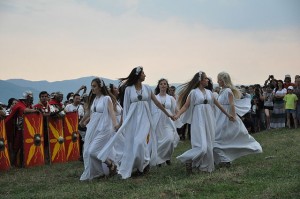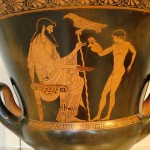Many secularists have argued that no public expressions of religion should be allowed – no hijabs, no cross pendants, no Easter processions, presumably no Pagan Pride Day, no street preaching (can’t say I would miss that one), no nothing.
No religious expression in public?
I have come across atheists arguing that the hijab, and the wearing of religious jewellery, should be banned. Given that many people wear religious symbols like the cross without any idea of their meaning, I think that such a ban would be way over the top. A friend overheard a conversation in a jewellery shop between two women contemplating the purchase of a cross pendant: “Do you want the plain one, or the one with the little man on it?” Clearly they had no idea at all what the difference between a cross and a crucifix is, or even what it signifies.
Since a person wearing a hijab headscarf, or a cross or a crucifix, or a Pagan pendant such as a mjollnir, valknut, pentagram, and so on, is not actually doing you any harm, why should you care what they choose to wear? I personally dislike the niqab and the burqa, but forbidding Muslim women to wear such garments is not the way forward. Let them choose what they want to wear, and if they want to wear something that offends your secular or feminist sensibilities, that is their choice. Plenty of Muslim feminists wear hijab. As long as it is not forced on them, and as long as they don’t try to impose their dress code on me, then let them get on with it. I also support those Muslim women who campaign against being forced to wear hijab, of course. I also happen to dislike large life-size (death-size?) crucifixes outside churches, but they are on private property, so again, they have a right to put them there. The point is, it should be a free choice.
As long as no-0ne is being harmed by the expression of religion (and the preaching of extreme racism and anti-LGBT bigotry does constitute harm), then public expression of religion is part of free speech and should be permitted.
If a Muslim or a Jew wants to eat halal or kosher meat (I am not convinced by arguments that halal and kosher methods of slaughter are any less humane than any other kind), and does not want to eat pork or drink alcohol, that is their prerogative. Just as it is the prerogative of a vegetarian to avoid meat altogether, or a vegan to avoid meat and dairy products altogether.
Some Pagan women choose to wear veils and headscarves to honour particular goddesses (such as Hera or Hestia). Again, you may not like it, but it is their choice.
If the local Muslim community wants to build a mosque, or the Hindu community wants to build a mandir, or the Sikh community wants to build a gurdwara, or the Buddhists want to build a temple, that’s great. It makes it all the easier to imagine that one day, we can have Pagan temples in every town.
I would personally prefer it if loud proselytising and evangelism in the street didn’t exist, but the cost of freedom of speech is that people are allowed to say stuff that others don’t agree with (as long as it isn’t hate speech and incitement to violence). As atheists are very fond of pointing out, “there is no right to not be offended“. Though there is a right to defend oneself against slander, libel, and hate speech.
Baroness Onora O’Neill, Chair of the Equality and Human Rights Commission, argued that it was possible to legislate against certain speech-acts, but that any ‘right not to be offended’ would be unworkable.
‘There is no way of securing freedom of expression if we also maintain that there is a right not to be offended.
‘Any supposed right not to be offended would founder on the fact that offensiveness is subjective, and would put others’ freedom of expression wholly at the mercy of the sensibilities of possible audiences, including audiences who may include some who are hypersensitive, paranoid or self-serving—or worse’.
Religious beliefs in the workplace
I have had discussions with atheists and secularists where they have said that people should not bring their religious beliefs to work. I must say that in many ways, I agree, where those beliefs are based in bigotry and prevent someone from doing their job properly (such as registrars who don’t want to marry same-sex couples, for example). However, my religious beliefs include a desire to care for the environment, and a desire to see everyone treated fairly: not because the gods command it, but because it is a natural human impulse. My religious beliefs include the desire for social and environmental justice for all beings on this planet, regardless of gender, sexual orientation, colour, and species.
When I was a trade union activist, there were eight people on the committee: two atheists, a Greek Orthodox Christian, a Catholic, an Anglican, a Baptist, a Druid, and me (a polytheist Wiccan). Considering that this was in a university, where the proportion of atheists is higher than in the general population, I found it significant that it was mostly people of religion who stepped up to volunteer for the trade union. The reason we ended up having that particular conversation was that the atheist guy jokingly said, when the Druid joined, “We seem to have a disproportionate number of Pagans on the committee” so I pointed out how many of the committee were Christians. We were acting on our religious conviction that everyone should be treated fairly. (Please note that I am not saying that it was because we believed that God or the gods command it, though I didn’t ask the Christians what the source of their belief in social justice was, but it was certainly a deep-seated impulse of conscience.)
So I think my conclusion here is that if your religious beliefs prevent you from doing your job properly, get a different job. I wouldn’t work for a company that manufactured weapons of war, because it would go against my conscience, and nor would I work for a company that was responsible for widespread environmental destruction, such as fracking, strip-mining, or cutting down large swathes of forest. So if you are a Christian who disagrees with same-sex marriage, don’t be a registrar of marriages in a country that permits same-sex marriage. Simple.
However, religious beliefs and ethics are not some optional bolt-on extra that can be detached and put away – they are a core part of people’s identity – whether that is a liberal religious identity or a conservative one. That does not mean that we cannot seek to challenge people who justify their homophobia by claiming that the Bible supports their bigotry (it doesn’t). We can and should seek to persuade them of the error of their views – but the corollary of this is, that they get to argue back. That is how free speech works. (I should add that this does not contradict the “no platform” argument, which is that if you host bigoted views in your premises or on your website, you are, in a sense, endorsing those views. Freedom of speech means that they can still get their own building or website where they can express those views.)
Separation of church and state
I agree with the separation of church and state in the United States, and wish that we didn’t have bishops in the House of Lords in the UK, and that the monarch was not head of the Church of England. I do not think it is appropriate for government to be so entwined with religion. I do find it interesting that it is acceptable (even required) for US politicians to state their faith in God, whereas if a UK politician states his or her belief in God, there is a general expression of distaste. Especially if that politician thinks that their illegal wars are justified by their religious faith (I’m looking at you, Tony Blair).
I object to universities having graduation ceremonies in Christian religious buildings, or with Christian prayers, unless other religions are also invited to take part, and that should include Paganism – but of course it usually doesn’t. Either every religion should be included, or no religion should be included.
If local councils and state legislatures have opening prayers and dedications, these should either be offered by all the different faiths, including humanist dedications and Pagan prayers, or not at all. The same goes for public statuary and sculpture, and public religious buildings: either all faiths should be included, or none at all.
I disagree with the requirement in UK schools that assemblies should be broadly Christian in character (except in schools where the majority of the students are of another faith), and so does the School Governors’ Association.
Freedom of expression
I completely agree with the National Secular Society (UK) that freedom of expression for everyone (the religious and non-religious alike) is the way forward, and applaud their efforts to get ‘blasphemy’ removed from the list of crimes in the UK, which it now has been. But freedom of expression for everyone means that there is freedom of expression for atheists and freedom of expression for people of religion.
Some years ago, I was fortunate to be able to attend the closing ceremony of a Buddhist sand mandala at the Museum of East Asian Art in Bath. Some Tibetan monks had come and made the sand mandala over several days. It was very beautiful. At the end of this process, as an expression of the Buddhist concept of impermanence, they swept it up and carried it down to the River Avon and offered it to the waters. They placed the multicoloured sand in a special vessel, and carried it under a beautiful silk parasol. The procession, led by the Buddhist monks, and with the rest of us following behind, made its way through the streets of Bath, down to the river. There, another monk blew into a very long trumpet to herald the beginning of the offering to the waters, and they emptied the vessel of sand into the river, and said a prayer (in Tibetan, I assume). It was very beautiful.
Last Easter, as I was leaving my house, I saw the local Christians processing with a donkey and a large and ornate cross, and some priests in all their finery. Very picturesque. And when I was in Italy in 2004, the local church had a big Easter procession. And in Greece, Easter is celebrated with great exuberance. Why ever not, as long as they don’t object to other religions publicly celebrating our festivals, or LGBT Pride parades, or Pagan Pride, or whatever.
Many traditional folk festivals are celebrated all over Europe, which have pagan origins or pagan themes. There is the wonderful revival of the celebration of Beltane on Calton Hill in Edinburgh. There are many folk festivals in Eastern Europe, especially in Bulgaria which has retained much of its pagan folklore and traditions.

By Saturnian – Own work, CC BY-SA 3.0.
Yes, it is annoying when someone tries to convert you to their religion. I really wish they wouldn’t. And sometimes they take it so far that it does become harassment. But that does not mean that all religious expression (even religious expression which does not seek to convert others) should be banned.
If all public religious expression was banned, we would lose many rich and interesting customs and practices, and colourful and exuberant processions. And that would be a sad loss.
The reason that laws banning things exist is because the prohibited things cause actual harm. Dangerous driving, murder, guns, hate speech, and so on, are all illegal or restricted in most countries because they are harmful. Most religious expression does not harm anyone, and so it should not be banned.
















